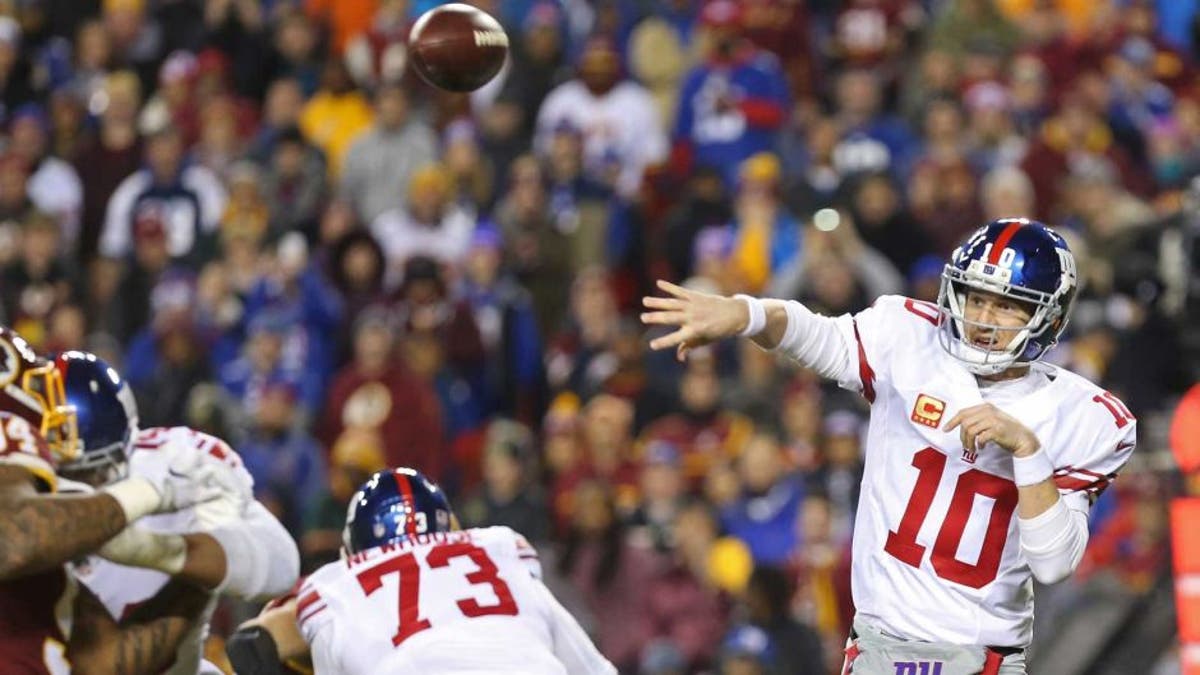
Jan 1, 2017; Landover, MD, USA; New York Giants quarterback Eli Manning (10) throws the ball against the Washington Redskins in the fourth quarter at FedEx Field. The Giants won 19-10. Mandatory Credit: Geoff Burke-USA TODAY Sports
Teams pursue byes like they are precious jewels. Are they really? Or does the road to the Super Bowl not particularly come with a rest stop?
History tells us that reaching the Super Bowl, let alone winning it, after playing in a wild-card game is anything but ideal. Not impossible -- just ask, in recent years, the 2005 Steelers, 2007 Giants and 2010 Packers. But it's certainly the most difficult way of doing things, particularly how those three teams managed it, as sixth seeds with no home games.
All of them are in this postseason. Not one of them went into this weekend wishing it didn't own a bye.
Yet there are advantages -- yes, really -- to being active in the wild-card round. For one, the opponent shouldn't be as formidable as either of the top two seeds in each conference that is enjoying a mini-vacation. Secondly, the momentum gathered from an opening win can carry teams a long way. Again, look up what those Pittsburgh, New York and Green Bay clubs above did.
"I think we're battle tested," Giants receiver Victor Cruz says, speaking not only of an early season loss at Lambeau Field, but of the team's general psyche. "I think we've been through some things after that game that really set the standard and the focus for this team. I think that's one of the biggest things for us going into the game. Understanding that we've been through some wars and now we're ready to go."
So the Giants go to Green Bay, where in 2007 they won the NFC championship game. And, four years later, they beat a 15-1 Packers squad in the divisional round. Both times, they went on to win a Super Bowl.
Eli Manning was the quarterback and offensive fulcrum of those title runs, while the pressure-first defense was masterful in negating big-time passers. The Giants entered those postseasons pretty much as afterthoughts, then got their acts together immediately in wild-card outings.
Sure they might have won it all those seasons anyway. Yet there's no question those opening victories against Tampa Bay in 2007 and Atlanta in 2011 helped in a big way.
"I think that you like to prove people wrong," Manning says, knowing the Giants again are long shots to win it all. "That is always kind of an exciting thing to do. I try not to read too much into it or read the headlines or buy into it too much.
"But I think that it is not about that. I think the most important thing is just going out there and being there for your teammates and wanting to step up for your teammates and for the organization, and everybody who is working their tail off every week to go win. And you want to go out and do your part to help them get that victory."
Under the current eight-division format with 12 playoff teams that began in 2002, teams playing in wild-card games have made the Super Bowl eight times: Carolina in 2003, Pittsburgh in `05, Indianapolis in `06, the Giants in `07 and 11, Arizona in 2008, Green Bay in 2010, and Baltimore in 2012. Six of them won the title, with only the Panthers and Cardinals failing, both with last-minute losses.
From 1990-92, there were six divisions, with 12 teams still advancing to the playoffs. Yep, three wild cards per conference, meaning one NFC and one AFC division winner didn't receive a bye. In that span, only four teams came out of the wild-card round to make the Super Bowl, all from the AFC. Buffalo (1992) and Tennessee (1999) both lost to the NFC champion. Denver (1997) and Baltimore (2000) won.
Indeed, the Titans beat the Bills in January 2000 in the Music City Miracle, and Buffalo hasn't been back to the postseason since.
One franchise that has made a habit of earning byes, of course, is New England. This is the sixth straight year the Patriots are idle for the opening weekend.
Even Tom Brady gets antsy during the bye, though.
"You always want to feel great on Sunday," Brady says. "You'd always like to practice every day, too. I think just some weeks it's about prioritization. I'd like to do everything all the time, but sometimes that's not possible just based on -- practice is pretty demanding. Our practices certainly are, so sometimes if you practice it might set you back a little more than you would want.
"But everyone is dealing with different things and I think as a player you just have to try to be smart. You obviously want to practice because you want to be prepared to play, but sometimes if you overdo it, you're not feeling as good as you want to on Sunday when you are playing. I think after 17 years I've got a pretty good balance for those things. I'm the type of person who likes to practice a lot. I've also been around long enough to know you've got to be smart, too, so it's just trying to find that right balance."
Brady can kick back this weekend while seeking that balance.
